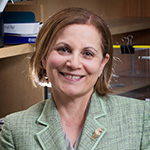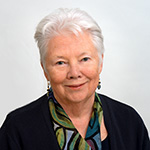Katya Ravid Named Inaugural Incumbent Barbara E. Corkey Professor of Medicine
 Katya Ravid, DSc
Katya Ravid, DSc
Katya Ravid, DSc, Professor of Medicine and Biochemistry, has been selected as the inaugural incumbent of the Barbara E. Corkey Professor of Medicine.
Dr. Ravid is nationally and internationally recognized for seminal discoveries in the field of megakaryocyte and platelet biology. Early in her career, she discovered a unique transcriptional signature consisting of several non-tissue specific transcription factors that govern the specification of the platelet lineage, among other bone marrow cells. Further, her studies uncovered mechanisms by which platelet precursors undergo polyploidy prior to platelet fragmentation and the functional significance of polyploidy in pathology. Her recent findings concerning megakaryocyte-induced bone marrow myelofibrosis serve as the basis for a therapeutic-based clinical trial. Her fundamental discoveries of the role of adenosine receptors and purine signaling in governing lineage determination and vasculo-thrombotic processes have been widely recognized. These achievements led to more than 150 publications and to continuous funding by the NIH. In addition, she is the author and editor of two textbooks. Dr. Ravid has been recognized by several national and international awards and societies, such as the American Heart Association Established Investigator Award, fellow of the American Association for the Advancement of Science, fellow of the French National Research Agency, University of Sydney Professorship Award, Weizmann Institute Visiting Professorship Award, and Fulbright Research Scholar Award. She currently serves as president of the Massachusetts Academy of Sciences.
At Boston University Dr. Ravid founded the first Transgenic/Knockout Core and served as its Scientific Director until 2014. Since 2009 she has led Evans Center for Interdisciplinary Biomedical Research Center in the Department of Medicine, and the new BU Interdisciplinary Biomedical Research Office since 2015. She has initiated and led a T32 training program in cardiovascular biology, a master’s program in Biological Core Technologies, and three graduate courses. In addition, she has mentored nearly 50 pre- and post-docs for which she has been recognized with teaching and mentoring awards.
 Barbara E. Corkey, PhD
Barbara E. Corkey, PhD
With the establishment of this Professorship, the Department of Medicine honors the remarkable contributions and legacy of Barbara E. Corkey, PhD, Professor Emeritus in the Department of Medicine. Dr. Corkey served as the Zoltan Kohn Professor of Medicine and Vice Chair for Research in the Department of Medicine. She has been a leader in the fields of diabetes and obesity research for more than 50 years with 190 related publications and 40 years of continuous government research support. The Corkey laboratory engaged in research on obesity and diabetes, with a particular focus on metabolic signal transduction in ß-cells, adipocytes and hepatocytes, intercellular communication via circulating redox and the role of hyperinsulinemia in obesity and diabetes. Projects in metabolic regulation have been ongoing since 1981 using such techniques as single cell imaging, metabolic profiling, ionic fluxes and membrane potential, respiration, redox state, reactive oxygen species generation and diet-induced obesity and diabetes models. She has received numerous honors including the NIH MERIT Award, National Honorary Membership in Iota Sigma Pi, the National Honor Society of Women in Chemistry, Women in Science Lecturer at the Boston Museum of Science, the George Bray Founders Award of the Obesity Society, the Charles H. Best Lectureship and Award, University of Toronto, the Banting Medal for Scientific Achievement from the American Diabetes Association and honorary membership in the European Association for the Study of Diabetes. A current major focus is on developing clinical/basic collaborative multi-PI projects to explore novel approaches to understand and treat metabolic diseases using Culinary Medicine.
The Department of Medicine and Boston University School of Medicine are privileged to be able to recognize the example and the contributions of Drs. Ravid and Corkey through this professorship.
View all posts